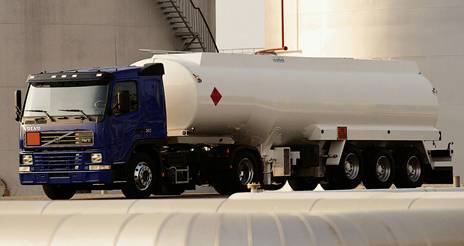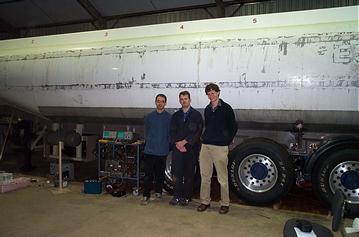How many times do the headlines include news of lorries rolling over and discharging their contents on to major highways causing traffic chaos?

In the United States where records are more complete the number of big trucks rolling over is around 15,000 per year. Official statistics in the UK are hard to come by, but 600 per year is a conservative estimate. Researchers in the Cambridge Vehicle Dynamics Consortium (CVDC), headed by Dr David Cebon are developing a system of active control to prevent this occurring.

"We have been studying the dynamics of heavy vehicles for some time and have developed advanced suspension concepts which balance the basic trade-off between roll and ride performance," explains David Cebon. "We have found that by controlling movement of the suspension with active anti-roll bars we can reduce the likelihood of a truck rolling over, and can also reduce the dynamic loads applied to the road surface and the road damage that results."
An entire 5-axle articulated lorry, with a variety of specially-built components has been donated by Consortium members. Volvo has given the University a tractor unit and Shell has provided a tanker semi-trailer. Tinsley Bridge has manufactured a set of special anti-roll bars; Meritor HVS has donated three independent air suspensions for the trailer, Dunlop has provided tyres and Koni has developed and manufactured a set of ten special continuously-variable shock absorbers - one for each wheel station. Fluid Power Design has designed and manufactured the key hydraulic systems,and Mektronika has built the micro-processor controllers.

The vehicle is being converted into a full-size experimental test rig, by radically modifying the suspension systems to include active anti-roll bars and 'semi-active' shock absorbers. "These systems will enable us to maximise roll-over safety, while simultaneously minimising road damage and improving driver and cargo ride" said Cebon.

The truck will eventually have a complex system of 20 actuators, 40 sensors and 5 computers, along with a hydraulic power supply and electrical generator. The computers control the actuators, monitor the sensors and communicate with each other via a digital data network. Safety is paramount, so sophisticated 'watchdog' computers are used to monitor performance continuously and check that nothing goes wrong. Computer control and fast reaction times mean that the tractor and trailer unit can be forced to roll in whatever direction the control strategy requires, and the resultant effect can be monitored. The vehicle will be tested on the DERA test track in Chertsey, with outriggers (like training wheels) to prevent roll over occurring during trials.





A team of four PhD students is working on the project, assisted by an army of technicians from the Engineering Department. "We currently have just about every available mechanical and electrical technician working flat-out on the project, building mechanical and electrical components", said Richard Roebuck, one of the students. "It is a huge undertaking".
This is a sophisticated and ambitious programme. "It has only been possible because the structure of the Consortium enables its Members to operate in a non-competitive environment, so that the component manufacturers are no longer working in isolation from each other. The strength of the programme arises from the strength of the team," remarks David Cebon. "The other factor is the multi-disciplinary skills of the students. Having been through the undergraduate engineering course at Cambridge they are capable of working in all these different areas of Engineering: from setting up sophisticated computer control systems to designing the mechanical, hydraulic and electrical systems. In an industrial environment, work like this would require a large team of engineers each with a different set of skills. Here, we have four researchers who are taking on the whole job. This not only gives excellent value for the research funds, but also means that there is total co-ordination and full understanding of the project amongst the team members. It is also a great learning opportunity for the students involved who will be highly skilled in many areas as a result of their work."

